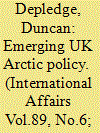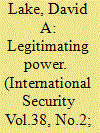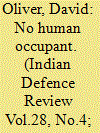| Srl | Item |
| 1 |
ID:
124761


|
|
|
|
|
| Publication |
2013.
|
| Summary/Abstract |
How is the United Kingdom engaging with changing geopolitics of the Arctic in the twenty-first century? This article considers the UK's contemporary interest(s) in the Arctic at a time of unprecedented change in the northern latitudes of our planet. In particular, it focuses on the ongoing emergence of UK Arctic policy as an assemblage of processes involving various actors-government officials, scientists and other academics, environmental campaigners, journalists and the private sector-which not only define UK interests but also delimit what the term 'Arctic' means to, and demands of, the UK. The focus of the article is directed at the recent activities by the Ministry of Defence, the House of Commons Environmental Audit Committee and the related work of the Foreign and Commonwealth Office to develop an Arctic Policy Framework, drawing on official government documents and a series of interviews conducted between 2010 and 2013 for evidence. The article concludes with the author's thoughts on tensions and contradictions that remain in the UK's policy towards the Arctic and the implications this might have at a time when global interest in the Arctic is growing rapidly.
|
|
|
|
|
|
|
|
|
|
|
|
|
|
|
|
| 2 |
ID:
124375


|
|
|
|
|
| Publication |
2013.
|
| Summary/Abstract |
The United States has maintained international hierarchies over the Western Hemisphere for more than a century and over Western Europe for nearly seven decades. More recently, it has extended similar hierarchies over states in the Middle East. How does the United States exercise authority over other countries? In a world of juridically sovereign states, how is U.S. rule rendered legitimate? Hierarchy has interstate and intrastate distributional consequences for domestic ruling coalitions and regime types. When the gains from hierarchy are large or when subordinate societies share policy preferences similar to those of the United States, as in Europe, international hierarchy is possible and compatible with democracy. When the gains from hierarchy are small and the median citizen has policy preferences distant from those of the United States, as in Central America, international hierarchy requires autocracy, and the benefits of foreign rule will be concentrated within the governing elite. In the Middle East, the gains from hierarchy also appear small, and policy preferences are distant from those of the United States. As a result, the United States has backed sympathetic authoritarian rulers. Although a global counterinsurgency strategy might be viable over the long term, the costs of establishing effective hierarchies in the region imply that the United States is better off retrenching "East of Suez."
|
|
|
|
|
|
|
|
|
|
|
|
|
|
|
|
| 3 |
ID:
125366


|
|
|
|
|
| Publication |
2013.
|
| Summary/Abstract |
As UAS technology matures and prices start to drop with from Commercial Off-The-Shelf (COTS) components, more agencies are becoming interested in adopting UAS platforms and the market is on the brink of yet another explosion. This will put more pressure on military users to refine the training of the man in-the-loop and for industry to look for innovative methods of keeping ahead of the expected surge in demand for UAS pilot operators.
|
|
|
|
|
|
|
|
|
|
|
|
|
|
|
|